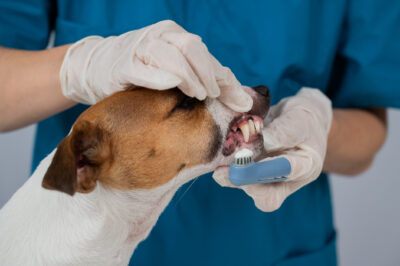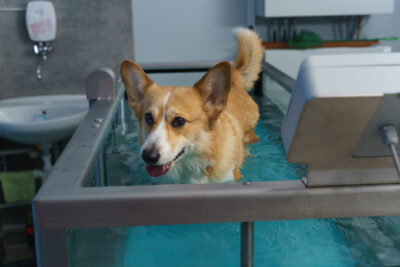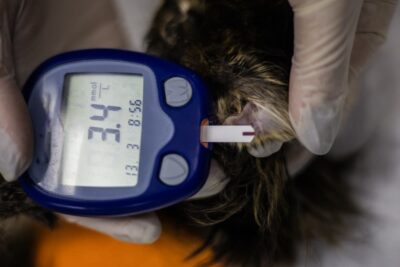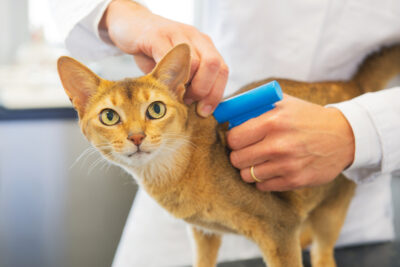7 Cold Weather Tips for Pets

One of my favorite childhood memories is seeing my ebullient Yellow Labrador leap through the snow like a dolphin while taking big chunks of snow into his mouth, as if feasting on a giant snow cone.
My dog certainly had fun in the snow, but cold weather can also be hazardous for both dogs and cats. To keep our furry friends safe, it’s important to understand cold weather risks and measures we need to take to protect them as best we can.
Why Is Cold Weather Pet Safety Important?
Dogs and cats already have some built-in protection against the cold — their fur coats. However, their coats alone aren’t enough to fully shield them from low temperatures and weather events like snowstorms.
When the weather turns cold, there are several precautions you can take and adjustments you can make in order to keep your furry friends safe.
With a little preparation, the colder months of the year will be nothing to worry about — and you and your pet can enjoy the season together.
7 Cold Weather Tips for Pets

To learn more about how to keep pets safe in cold weather, we spoke to Dr. Anna Kaufman, a veterinarian at Bond Vet in New York, and Kara Starzyk, shelter manager at Abandoned Pet Rescue in Florida,
Let’s go over their top cold weather tips for pets.
Consider their paws
Both dogs and cats regulate temperature through their paws, so keeping your pet’s paws warm and protected is one of the most important things to do in cold weather.
Dr. Kaufman recommends putting balm on your pet’s paws if they go outside. Or even putting them in booties. “Booties are great for protecting paws from toxic products used to melt snow and ice,” Dr. Kaufman says. “It is important once you take the booties off to make sure your dog’s feet are dry so that they do not harbor moisture.”
Dr. Kaufman also says that you should avoid taking your dog — or cat — on surfaces covered in ice or snow, which she says can be “rough on their paws.” She advises pet parents to be aware of “ice or holes hidden under snow,” as these pose a danger for pets to walk on.
Rethink outdoor activities
Playing in the snow can be fun for both dogs and cats, but pet parents should rethink some outdoor activities when the mercury drops — or when there’s a significant weather event like a blizzard.
Starzyk suggests “shorter times outside” when it’s cold out — or to even avoid outdoor activities when the weather is particularly harsh. “Look for alternatives to play with them, whether it’s an indoor dog park or just more activities indoors to get the exercise they need without getting overheated or frostbite in colder weather,” she says.
Bundle up

Besides booties, cold weather is a good excuse to put your dog in an “adorable sweater,” says Starzyk.
If your pet is spending time indoors, Starzyk also recommends giving your pet comfy blankets to help them keep warm — but make sure to be safe.
“I would say on that note be very careful with the electric blankets,” she warns. “It’s never safe to put it in a pet’s crate because if it does get too hot, they can’t get away from that blanket and it could burn them.”
Never leave your pet outside
Pet parents should never leave their pet outside in the cold weather, even if there is outdoor shelter available, Starzyk says. “When temperatures drop too low, it affects the pet’s ability to stay warm and it’s just not safe.”
Moreover, Starzyk says pet parents shouldn’t take pets out for long walks — even if they’re wearing booties.
If you think your dog has spent too much time outside, Dr. Kaufman says, you should “take them inside and wrap them in a clean towel or blanket.”
Watch for signs that your pet is too cold

If a dog or cat is exposed to the cold for too long, they can develop dangerous medical conditions, such as frostbite or hypothermia, so it’s important to know the signs to look out for.
“While I hope this is never the case, dogs with mild hypothermia may shake or slow down on a walk,” Dr. Kaufman says. “They may curl up to make themselves as small as possible to conserve warmth. Their ears or paws may be cold to the touch.”
“In the more extreme cases, they may become very stiff and lose consciousness among other life-threatening changes,” she adds.
Safeguard from toxic chemicals
Another thing you need to be mindful of is antifreeze and other substances used to get rid of ice.
“One way to protect against antifreeze is by using pet-safe options, as well as putting booties on your pet when walking outside,” Dr. Kaufman says. “In general, we should discourage our pets from eating things off the street. When it comes to toxins in the environment like antifreeze or rodenticide, if you think your pet has ingested something they shouldn’t, I recommend seeking veterinary care in addition to calling ASPCA Poison Control.”
Starzyk says pet parents should also be mindful to keep antifreeze products away from their pets inside the house.
“Cats and dogs are really like toddlers that can get into the cabinets,” she explains, “so it’s important to have child-proof locks on those cabinets or keep those items up and on a top shelf that a dog couldn’t reach. A cat can always jump up there, so really have them in secure containers or secure cabinets. And if the pet does ingest a toxic chemical, it’s very important to get [them] to an emergency room right away so that they can be treated, because even if you don’t see direct symptoms right away, it could cause long-term kidney issues or digestive issues.”
Be ready for an emergency

Before cold weather hits, Starzyk recommends having an emergency kit ready, especially if your pet has special medication.
“It is good to have a backup of those medications in case you can’t get a prescription filled,” she says.
She also recommends identifying a veterinarian you can take your dog or cat to in an emergency, and contacting them ahead of time to see if they stay open in severe weather.
“There are some nowadays that are built to withstand hurricanes and snowstorms,” she adds, “and it’s good to know one that is nearby, if needed.”
Pets and Cold Weather: Other Advice
Cold weather and snow can be enjoyable for your dog or cat, if you take the necessary precautions to protect them.
Generally, if you’re unsure if the weather is too cold for your pet, Dr. Kaufman has this recommendation: “Err on the side of caution and keep them inside.”









